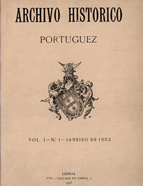

................................
First published in 1903, the Archivo Historico Portuguez was a monthly publication (in instalments) until 1916/17, but with a short hiatus between 1910 and 1914 as a result of the transition between regimes. It was later grouped into 11 volumes (with a single price of 4$800 reis ). An initiative of Anselmo Braamcamp Freire and D. José da Silva Pessanha, who were its directors, the Archivo occupies a prominent place in the landscape of periodical publications on history in Portugal and is widely regarded as the country’s first history journals in the historiographical sense of the term. The publication of the Archivo owed much to its main promoters, who to a large extent ensured the journal’s relative longevity (including financial support). It was no coincidence that its directors were involved in or distinguished themselves in the field of historical studies in its many aspects: for example, Silva Pessanha was curator of the Torre do Tombo and A. Braamcamp Freire, who at the time had not yet published most of the works for which he became known, was nevertheless a prominent figure in Portuguese political culture (a peer of the realm, he had already held public office in local government and went on to hold important positions in the First Republic).
In the “Warning” published in the first issue, with the aim of setting out the principles underlying the journal, and signed by the editors, we can list the following aspects: (i) a criticism of the state of conservation and organisation of historical sources, “In countries where history is, and has been, studied seriously, where archives and libraries are organised in such a way as to facilitate research by scholars (...) but among us, unfortunately, this is not the case” (AHP, vol. I, p. V); (ii) at the same time, a criticism of the historiographical environment or dynamics that existed at the time and a social criticism, which exposed – albeit very superficially, it must be said – the idea of “decadence”, a concept very much in vogue in part of the political (and historiographical) culture of the last quarter of the nineteenth century, “The general indifference to historical studies, which still prevails in Portugal today, is yet another symptom of the profound decadence into which the present generations have fallen. They are blinded by the independence and haughtiness of many of their predecessors, and, so as not to have to blush, they prefer to ignore them. This is perhaps why historical studies are so despised among us and find so little enthusiasm among the public, which, poorly educated, sometimes takes for gold what is nothing more than shiny tinsel.” (Idem, p. VI). Thus, the promoters of the Archivo understood their target audience to be a specialised audience of academics and scholars: “It is not, therefore, for the public that this Archivo is intended; it is exclusively for scholars.” (Idem, p. VI). This journal thus contrasted with the legacy of several generalist periodicals for the general public that began to appear in the 1830s (e.g., O Panorama ), in which we find an important section devoted to historical subjects, but also to other topics.
This work is financed by national funds through FCT - Foundation for Science and Technology, I.P, in the scope of the projects UIDB/04311/2020 and UIDP/04311/2020.
